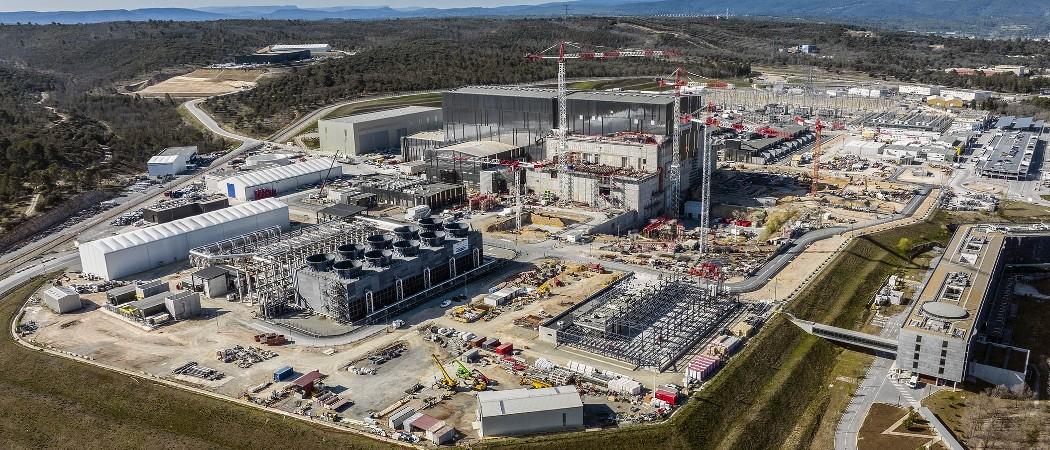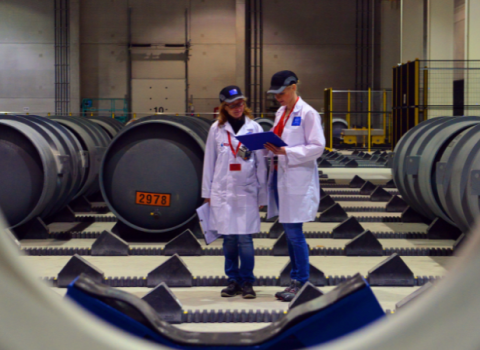Despite the auditors’ warning, managers of the fusion energy project say Russia is currently sticking to its commitments, with a giant magnet dispatched from St Petersburg earlier this month

An aerial shot of the ITER fusion mega-project in the south of France, taken in April 2022. Photo: ITER Organization
The invasion of Ukraine could lead to delays and cost overruns at the ITER fusion mega-project in the south of France because Russia is providing key parts and a budget contribution, the EU’s financial watchdog has warned.
The European Court of Auditors said Russian involvement in the multi-billion euro attempt to create a source of clean, abundant energy by mimicking the reaction that powers the sun, “presents a risk of further delays and increased costs for the ITER project.”
“We draw attention to the fact that Russia is a member of the ITER-IO, with the obligations to deliver to the ITER assembly site in France several components for the ITER projects and to provide annual contributions,” the court notes in an audit of EU joint undertakings released today.
ITER is one of the last remaining threads of scientific collaboration between the west and Russia after European countries severed official research ties following the invasion of Ukraine.
Begun during the Cold War and with a budget to date of around €35 - €40 billion, ITER was founded by the EU, China, India, Japan, South Korea, Russia and the US. The EU contributes around half of the project costs, and the rest 9.1% each. These contributions are largely in the form of parts shipped to the site in the south of France.
But the war in Ukraine and resulting sanctions, which have targeted transport and shipping connections, have slowed down the delivery of Russian parts. Earlier this year, the deputy chief financial officer at Fusion for Energy, which manages Europe’s contribution to ITER, also warned sanctions would likely delay the project.
Land deliveries from Russia, including electrical equipment, have continued throughout the year, a spokesman for ITER said, although there have been delays in the order of weeks.
One of six giant magnets, called poloidal field coils, was supposed to depart from St Petersburg to Marseille in May, but difficulty finding a ship meant it did not set sail until earlier this month, he said.
But this magnet is not scheduled to be installed until a few years from now, so the delay will not slow down the project as a whole.
“While I can’t predict the future, I have seen nothing to indicate that, based on current circumstances, we should expect delays in Russian contributions,” the spokesman said. “On the contrary, our contacts in the Russian government have continued to assure us of their intentions to continue full support for the ITER project.”
Responding to the ECA report, Fusion for Energy also sought to reassure the auditors that Russia is committed to ITER. “It is understood that Russia will do its outmost to find a solution to provide both its in-kind and in-cash contribution to ITER. The potential impact on schedule and cost cannot be quantified at this stage,” it said.
A new baseline
The auditors also warn that in the first quarter of 2023 a new ITER “baseline”, setting out the calendar for certain achievements, will significantly push back the dates when it expects to hit key milestones.
Currently, ITER officially expects a first operational test in 2025, and to achieve full fusion power by 2035.
But this baseline was adopted in 2016, and since then, construction and manufacturing delays, plus the pandemic, have made the 2025 date increasingly unlikely, the ITER spokesman said.
In the auditors’ report, Fusion for Energy also warns there is a risk of further delay due to problems welding the vacuum vessel sections that form the steel chamber in which the fusion experiments will take place.
ITER is also looking into corrosion on some of the cooling piping inside vacuum vessel thermal shields, said the ITER spokesman.
“For a project of this complexity, issues like this are to be expected,” he said. “But there is no way to accurately project schedule impacts until we’ve taken a clear decision on the appropriate solution.”





 A unique international forum for public research organisations and companies to connect their external engagement with strategic interests around their R&D system.
A unique international forum for public research organisations and companies to connect their external engagement with strategic interests around their R&D system.